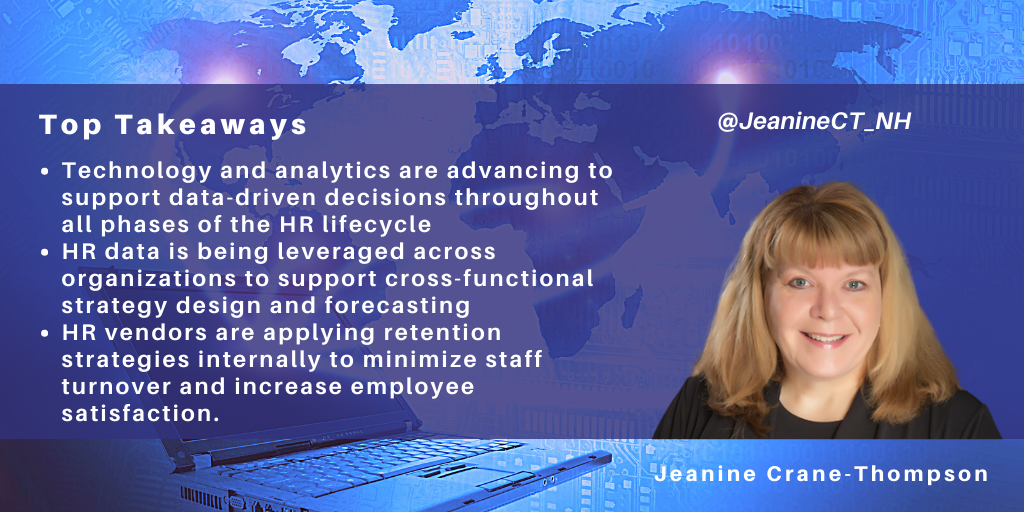posted on Sep 28, 2022 by Jeanine Crane-Thompson

Earlier this month, the 2022 HR Technology Conference saw more than 400 vendors and 5,000 participants descend upon the Las Vegas Mandalay Bay Hotel & Conference Center. Attendees presented industry trends, learned from colleagues, viewed demos of the latest technologies, and met face-to-face in what felt like a pre-2020 setting.
Several key observations from this year's conference include:
- The considerable number of start-up companies and niche players with highly targeted and specialized service offerings, such as industry- or skill-specific recruitment services
- The impressive volume of equity funding investments across the HR technology market (e.g., during the conference, global employer of record solution provider Atlas, in partnership with Sixth Street Growth, announced their $200m strategic equity investment)
- The increased organizational focus on employee retention strategies in response to the "great resignation" and, more recently, the impact associated with "quiet quitting".
The pandemic and the new world of work have been catalysts to the transformational service and technology shift experienced within the HR industry in the past 24 months. A common theme in these changes has been the expanded use of technology and analytics throughout all phases of the HR lifecycle, from candidate selection and hiring efficiency to employee retention.
Technology plays a critical and evolving role in recruiting and digital onboarding in this fast-growing market. With its Flex HR platform, Paychex onboarded ~2m hires in one year, with 80% of the new employee onboarding completed on a mobile device. NXTThing RPO and JazzHR reduced the cycle time required to hire and onboard new talent by 50%. In addition to helping its clients improve employee retention, NXTThing RPO is walking the talk with 0% turnover of its recruiters. The company attributes this accomplishment to the treatment of its employees; e.g., healthcare is 100% paid for by the employer, employees receive unlimited paid time off (PTO), a performance-based bonus plan for all employees, and a flat management structure.
After briefings with over three dozen vendors at the conference, it's clear that the application of data science and artificial intelligence to provide predictive HR insights has evolved into reality. Managed payroll provider, Paychex, conducts ongoing salary benchmarking and frequent performance review sessions to increase employee retention. Employee retention risk factors, including salary inequities and high-demand job roles, are available via a talent scorecard, enabling managers to approve pay increases outside the defined performance review cycle.
Compensation management software company, Decusoft, developed a people analytics module presenting real-time pay-equity and diversity data. The system also enables managers to run data models providing greater budget certainty and the ability to identify and resolve retention trends. From an employee perspective, Decusoft generates total compensation and rewards statements presenting a holistic view of their pay, benefits, bonuses, equity, healthcare, paid leave, and retirement contributions. These data are accessible in real-time to keep employees apprised of their compensation history.
HR data analysis and usage is expanding to provide valuable insights beyond the HR department. Predictive analytics can support the identification of high-potential employees at the highest risk of resignation and anticipated job vacancies based on multi-year retirement horizons or projected production volumes.
IBM's recruitment process outsourcing group assesses and optimizes the employee onboarding and initial learning experience to support talent retention. According to the Employ-Inc Q3 2022 quarterly report, 63% of the recruiters surveyed experienced new hires leaving in the first 90 days after starting a new job, and 52% of those respondents believe it was because they were the wrong candidate for the position. Poor initial training experiences may also lead to candidates quitting or resigning before their first job. While the new employee experience is critical to successful onboarding and engagement, companies must also focus on providing opportunities available to existing employees to manage voluntary attrition. To address this vital need, the IBM team also delivers internal mobility services by analyzing talent and skills data to evaluate employee profiles and support hiring managers to promote from within the organization.
Increased employer/employee communication and transparency, expanded benefits offerings, and flexible work schedules and locations are characteristics of the new world of work. The global talent shortage has exacerbated an already challenging hiring environment for employers. To succeed, today's leaders require a focus on employee experience throughout the enterprise, refreshed hiring policies and practices, and modern systems enabled by data to attract and retain their workforce.




